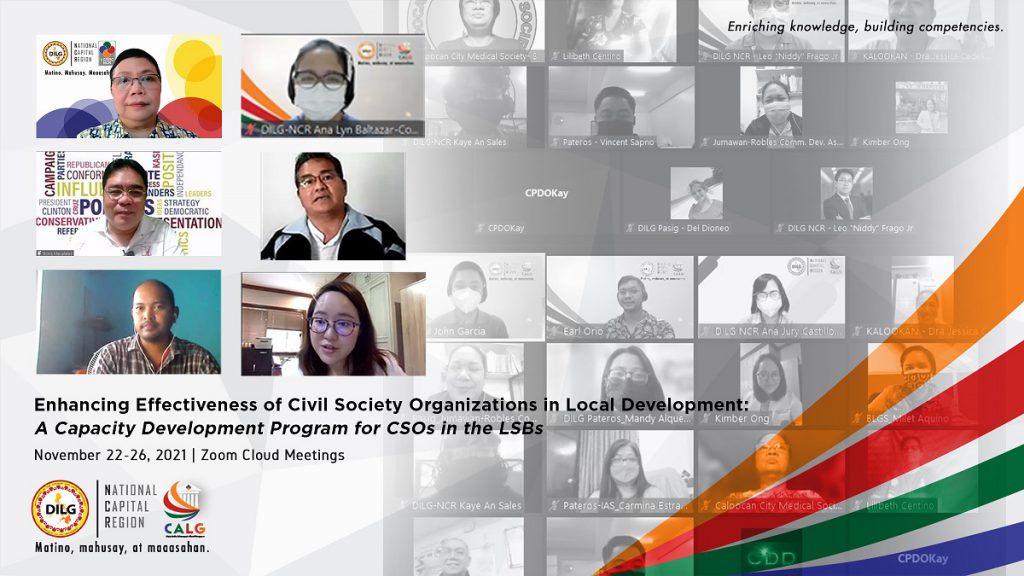
âItong seminar na ito ay nagbigay sa akin ng encouragement at nag-challenge sa akin na gamitin ang aking posisyon sa local special body upang maiparating ang ninanais na mga adbokasiya ng mga CSO.â That was how Lilibeth Centino of the WOMEN Inc. of Quezon City described her experience in the online series of capacity development programs for civil society organizations in local special bodies held last November 22-26.
Centino, along with 26 other civil society organizations from the women, youth, urban poor, persons with disability, homeowners association, transport group, health, and education sectors participated in the week-long training-workshop organized by the Support to Local Governance Program (SLGP) Team of DILG-NCR.
Dubbed as âEnhancing the Effectiveness of CSOs in Local Developmentâ, the pilot-run of the capacity development program provided the CSO members of LSBs the necessary information and skills to effectively perform their mandated functions as members of the Local Development Council (LDC), Local School Board (LScB), or the Local Health Board (LHB).
Participants in the series of online activities included representatives from the LSBs of Quezon City, Pasig, Taguig, Caloocan, and the Municipality of Pateros.
In the first run for LDC members on November 22-23, local development and planning expert Rogelio Diaz discussed the key dimensions of development, the local development council operations from the planning up to the monitoring and evaluation of LGU programs, projects, and activities, and how the country is faring in fulfilling its commitments in relation to the Sustainable Development Goals.
On the other hand, social development practitioner and broadcaster Jose Nomer Macalalad focused on their soft skills, such as communication and negotiation skills, which are vital to effectively dealing with the LDC. He also discussed the current LGU executive and legislative powers and dynamics, and how these influence local development.
For the LScB session held on November 24, seasoned LSB member Juan Paulo Rodriguez talked about the current status of education in the country and how the current local school board can be reinvented to expand its membership and functions as in the case of Naga City and Valenzuela City.
The third instalment of the program focused on the LHB. For two days, public health expert and medical practitioner Dr. Kimber Ong stressed the importance of looking at a holistic approach to health governance, as she discussed the social determinants of health and how CSOs in the LHB can use this platform for participatory governance and in contributing to social change.=
After each session, participants engaged in action planning, sharing their vision for their particular advocacies and LSBs.
This capacity development program will be mainstreamed and conducted every time the LSBs are reconstituted, and has been endorsed to the Local Government Academy for sustainment. More importantly, the program will form part of the preparatory activities for the implementation of full devolution starting in 2022.
âNais kong ipaalam ang aking marubdob na pagpapahalaga o appreciation sa inyong gampanin bilang mga CSO sa kolektibong pagpapaunlad ng ating mga pamayanan. Kaya naman, nananalig ako sa ating tuluy-tuloy na pagkakapit-bisig bilang mga magkakatuwang sa pagpapanday ng maaliwalas na bukas para sa ating mga mamamayan,â DILG-NCR Regional Director Maria Lourdes Agustin said in Filipino as she acknowledged the critical role of CSOs in local development come 2022 and beyond. #
